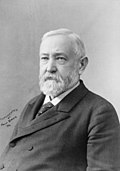Redfield Proctor
Redfield Proctor | |
|---|---|
Stephen Elkins | |
| 37th Governor of Vermont | |
| In office October 3, 1878 – October 7, 1880 | |
| Lieutenant | E. Pomeroy Colton |
| Preceded by | Horace Fairbanks |
| Succeeded by | Roswell Farnham |
| 31st Lieutenant Governor of Vermont | |
| In office October 5, 1876 – October 3, 1878 | |
| Governor | Horace Fairbanks |
| Preceded by | Lyman G. Hinckley |
| Succeeded by | E. Pomeroy Colton |
| Personal details | |
| Born | June 1, 1831 15th Vermont Infantry |
| Battles/wars | American Civil War |

Redfield Proctor (June 1, 1831 – March 4, 1908) was a U.S.
Biography
Redfield Proctor was born on June 1, 1831. a native of Proctorsville, a village named after his family in the town of Cavendish in Windsor County, Vermont. His father, Jabez Proctor, was a farmer, merchant, and prominent local Whig politician. He was raised by his mother, Betsy Parker Proctor (1792–1871), from age 8 after the sudden death of his father. Proctor's first cousins on his mother's side included Isaac F. Redfield and Timothy P. Redfield, both justices of the Vermont Supreme Court.
After graduating from
Civil War
Upon the outbreak of the
Career
After being mustered out of military service in 1863, Proctor initially returned to practicing law, this time in Rutland, Vermont. He entered into law partnership with Wheelock G. Veazey. In 1869, he entered business again, taking a job as a manager in the Sutherland Falls Marble Company. In 1880, this company merged with another to become the Vermont Marble Company, over which Proctor served as president. Six years later, the area containing the company's marble quarries was split into a separate town called Proctor.
During these years, Proctor began his political career. In 1866 he became a selectman of the town of Rutland. In 1867 he represented his town in the
In 1876 Proctor was elected
In 1888, he was again elected to the Vermont House. Following the 1888 presidential election, the Vermont legislature unanimously recommended him for a cabinet position, and in March 1889,
From President Harrison State of the Union Address, Dec 1892:
The report of the Secretary of War exhibits the results of an intelligent, progressive, and businesslike administration of a Department which has been too much regarded as one of mere routine. The separation of Secretary Proctor from the Department by reason of his appointment as a Senator from the State of Vermont is a source of great regret to me and to his colleagues in the Cabinet, as I am sure it will be to all those who have had business with the Department while under his charge.
In the administration of army affairs some especially good work has been accomplished. The efforts of the Secretary to reduce the percentage of desertions by removing the causes that promoted it have been so successful as to enable him to report for the last year a lower percentage of desertion than has been before reached in the history of the Army. The resulting money saving is considerable, but the improvement in the morale of the enlisted men is the most valuable incident of the reforms which have brought about this result.[4]
Proctor left the War Department in November 1891 to become a United States Senator, filling the vacancy caused by the resignation of
Death
Proctor died in
See also
- List of United States Congress members who died in office (1900–49)
References
- ^ "Redfield Proctor". United States Congress. Retrieved 26 April 2013.
- ^ "Redfield Proctor". The Political Graveyard. Retrieved 23 November 2012.
- ^ "Redfield Proctor". Biographical Directory of the United States Congress. Retrieved 23 November 2012.
- ^ State of the Union Addresses by Benjamin Harrison – via www.gutenberg.org.
- ^ "Redfield Proctor". Govtrack US Congress. Retrieved 23 November 2012.
External links
- Works by or about Redfield Proctor at Internet Archive
- Garraty, John A. and Mark C. Carnes. American National Biography, vol. 17, "Proctor, Redfield". New York : Oxford University Press, 1999.
- Jacob G. Ullery, compiler, Men of Vermont: An Illustrated Biographical History of Vermonters and Sons of Vermont, (Transcript Publishing Company, Brattleboro, VT, 1894), Part II, pp. 327.
- Bell, William Gardner (1992). "Redfield Proctor". Secretaries of War and Secretaries of the Army. United States Army Center of Military History. CMH Pub 70-12.
- Wayne Soini. "The Cuban Speech: The United States Goes to War with Spain, 1898." Bloomington, IN: iUniverse, 2013.
- United States Congress. "Redfield Proctor (id: P000547)". Biographical Directory of the United States Congress. Retrieved on 2008-02-14
- Redfield Proctor at Find a Grave
- Govtrack US Congress
- Redfield Proctor, late a senator from Vermont, Memorial addresses delivered in the House of Representatives and Senate. 1909.






